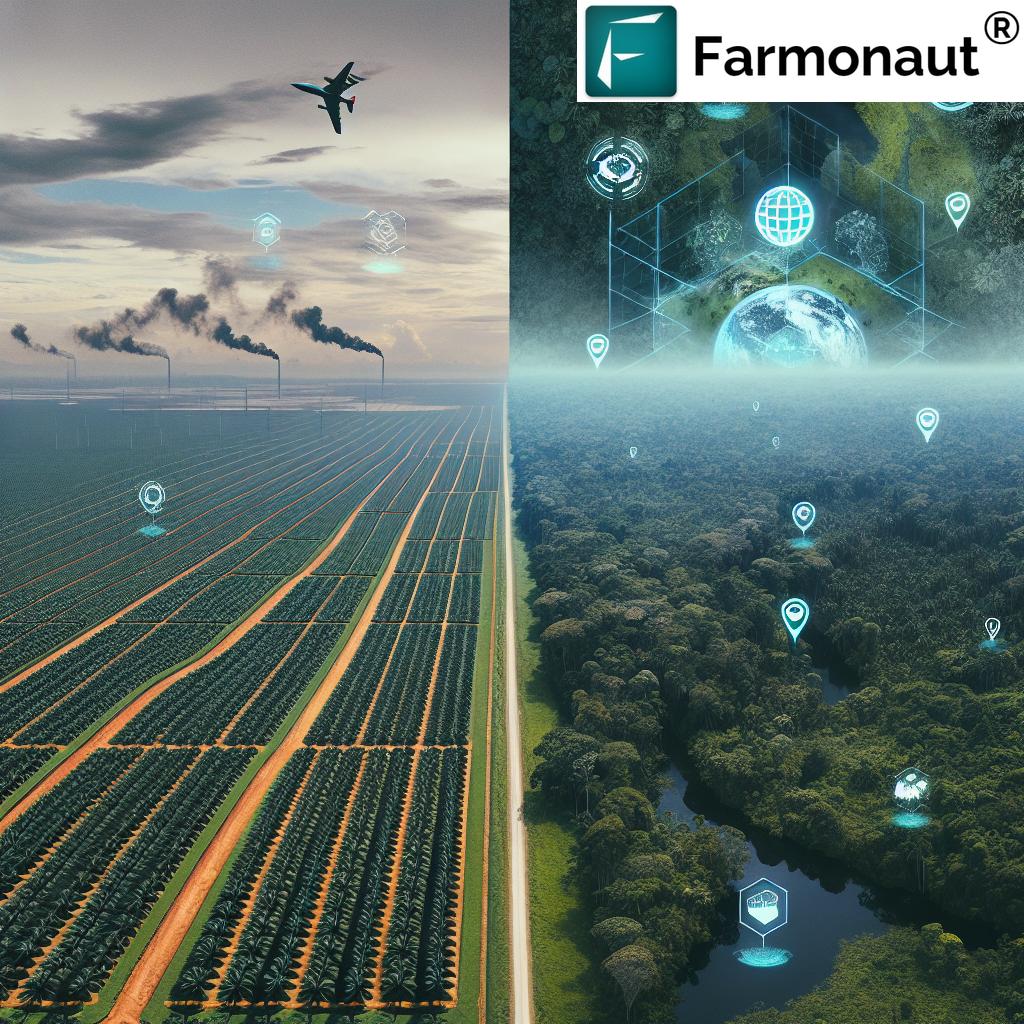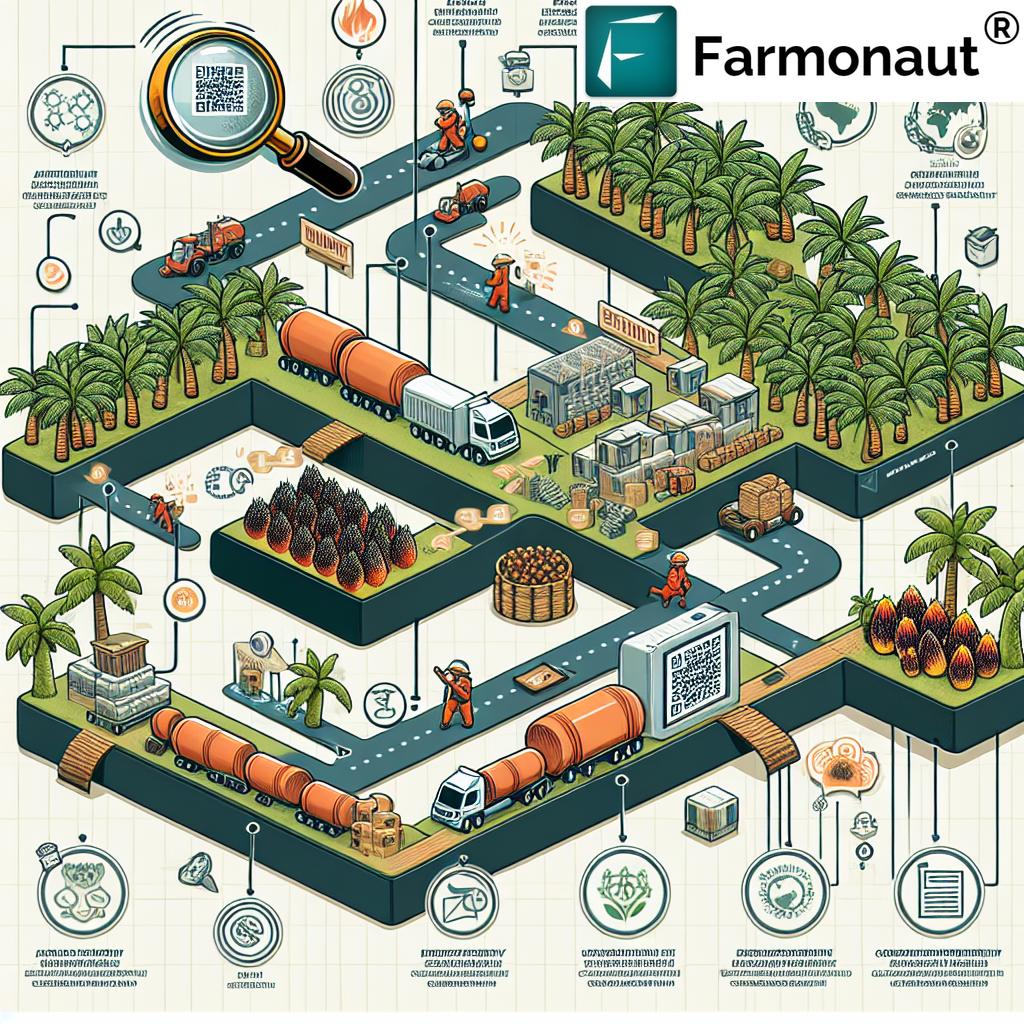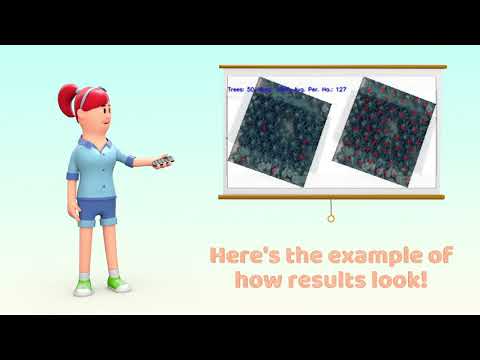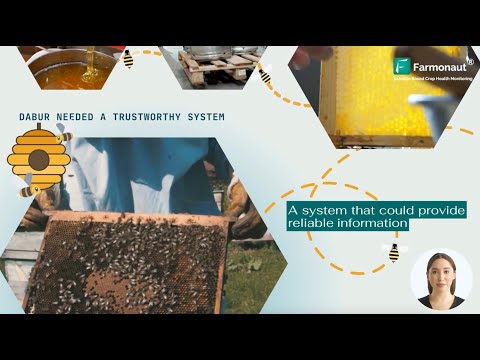Uncovering the Truth: Palm Oil’s Impact on Tropical Forests and the Quest for Sustainable Supply Chains

“50% of palm oil supply chains remain untraceable, hindering efforts to confirm deforestation-free sourcing.”
In the heart of our planet’s lush tropical forests, a complex battle is unfolding. On one side, we have the ever-growing demand for palm oil, a versatile commodity found in countless products we use daily. On the other, we face the urgent need to protect our precious ecosystems and combat climate change. As we delve into this critical issue, we’ll explore the intricate web of sustainable palm oil production, deforestation-free supply chains, and the innovative solutions that could reshape the industry’s future.
The Palm Oil Predicament: A Global Challenge
Palm oil has become an indispensable ingredient in our modern world, found in everything from food products to cosmetics. Its versatility and high yield have made it a favored crop for farmers and manufacturers alike. However, this popularity comes at a significant cost to our environment, particularly in tropical regions where palm oil plantations have expanded rapidly.
The crux of the problem lies in the opacity of palm oil supply chains. Despite increased commitments to reduce deforestation, many companies struggle to trace the origins of their palm oil effectively. This lack of transparency creates a significant obstacle in ensuring that the palm oil we consume is not contributing to the destruction of vital ecosystems.
Tracing the Path: The Complexity of Palm Oil Supply Chains
To understand the challenges we face, it’s crucial to examine the intricate journey of palm oil from plantation to product. The supply chain typically involves multiple stages:
- Cultivation in tropical regions
- Harvesting and initial processing
- Transportation to refineries
- Further processing and manufacturing
- Distribution to consumers
At each of these stages, the opportunity for opacity increases. Without robust traceability systems, it becomes nearly impossible to guarantee that the palm oil in a product hasn’t contributed to deforestation or the destruction of peatlands.
Explore how Farmonaut’s innovative solutions can help tackle these traceability challenges. Try our web app or check out our API for advanced satellite-based monitoring capabilities.
The High Stakes: Protecting High Carbon Stock Forests and Peatlands
When we talk about the impact of palm oil production on the environment, two critical ecosystems come into focus: high carbon stock (HCS) forests and peatlands. These areas are not just biodiversity hotspots; they’re also crucial carbon sinks that play a vital role in mitigating climate change.
“Tropical peatlands store up to 20 times more carbon per hectare than tropical forests, making their protection crucial.”
High carbon stock forests are areas with dense vegetation that store significant amounts of carbon dioxide. When these forests are cleared for palm oil plantations, vast quantities of CO2 are released into the atmosphere, contributing to global warming. Similarly, peatlands are wetland ecosystems that have accumulated layers of organic matter over thousands of years. These areas are incredibly efficient at storing carbon, but when drained for agriculture, they release enormous amounts of greenhouse gases.
The protection of these ecosystems is not just an environmental imperative; it’s a global necessity in our fight against climate change. As we strive for sustainable palm oil production, safeguarding these high carbon stock areas must be at the forefront of our efforts.
Progress and Pitfalls: The Current State of Palm Oil Sustainability
In recent years, we’ve seen a growing awareness of the need for sustainable palm oil production. Many companies have made public commitments to eliminate deforestation from their supply chains. However, the road to truly sustainable palm oil is fraught with challenges.
- Increased commitments to sustainability
- Implementation of certification schemes like RSPO
- Development of satellite monitoring technologies
- Challenges in smallholder inclusion
- Persistent issues with supply chain transparency
While progress has been made, significant hurdles remain. Many companies struggle to translate their commitments into actionable results, often due to the complexity of their supply chains and the difficulty in tracing palm oil to its source.
Discover how Farmonaut’s remote sensing technology can revolutionize supply chain monitoring. Download our Android app or iOS app to see our capabilities in action.
The Transparency Gap: Agricultural Sustainability Reporting
One of the key issues in achieving truly sustainable palm oil production is the disparity in reporting practices across the industry. While some companies have made significant strides in transparency, others lag behind, creating a patchwork of information that makes it difficult for consumers and stakeholders to make informed decisions.
Agricultural sustainability reporting plays a crucial role in addressing this transparency gap. By providing clear, comprehensive information about their sourcing practices, companies can build trust with consumers and demonstrate their commitment to environmental stewardship. However, the quality and depth of reporting vary widely across the industry.
Key Elements of Effective Sustainability Reporting:
- Clear traceability data for palm oil sources
- Detailed information on deforestation-free commitments and progress
- Metrics on carbon footprint and efforts to reduce emissions
- Disclosure of practices related to peatland protection
- Information on smallholder engagement and support programs
As we move towards more sustainable palm oil production, improving the consistency and quality of sustainability reporting will be crucial. This not only helps stakeholders make informed decisions but also drives competition and innovation within the industry.
| Company Name | Traceability to Plantation (%) | Deforestation-free Commitment (Year) | HCS Assessment Coverage (%) | Peatland Protection Measures (Scale 1-5) | Smallholder Inclusion Program | Sustainability Certification |
|---|---|---|---|---|---|---|
| EcoOil Co. | 85 | 2015 | 70 | 4 | Yes | RSPO, ISCC |
| GreenPalm Ltd. | 92 | 2013 | 80 | 5 | Yes | RSPO, ISCC, MSPO |
| SustainablePalm Inc. | 78 | 2017 | 65 | 3 | Yes | RSPO |
| PalmTech Solutions | 60 | 2019 | 50 | 2 | No | ISCC |
| EcoPalm Futures | 88 | 2014 | 75 | 4 | Yes | RSPO, ISPO |

The EU Deforestation Regulation: A Game-Changer for Global Supply Chains
As the world grapples with the challenges of sustainable palm oil production, regulatory bodies are stepping up to drive change. The European Union’s Deforestation Regulation stands out as a potentially transformative force in the industry. This new legislation aims to ensure that products sold in the EU market are not linked to deforestation or forest degradation.
Key aspects of the EU Deforestation Regulation include:
- Mandatory due diligence for companies importing forest-risk commodities
- Requirement for traceability to the plot of land where commodities were produced
- Strict penalties for non-compliance
- Enhanced monitoring and enforcement mechanisms
For palm oil producers and traders, this regulation represents both a challenge and an opportunity. While it will undoubtedly increase the pressure to improve traceability and sustainability practices, it also provides a clear framework for companies to demonstrate their commitment to deforestation-free supply chains.
Learn how Farmonaut’s blockchain-based traceability solutions can help your business comply with new regulations. Explore our API Developer Docs for integration options.
Innovative Solutions: The Role of Technology in Sustainable Palm Oil
As we face the complex challenges of sustainable palm oil production, technology emerges as a powerful ally. Innovative solutions are paving the way for improved traceability, more effective monitoring of forest-risk commodities, and better assessment of carbon storage in ecosystems.
Remote Sensing and Satellite Monitoring
One of the most promising technologies in the fight against deforestation is remote sensing. Satellite imagery and advanced analytics allow us to monitor vast areas of land in real-time, detecting changes in forest cover and identifying potential areas of concern. This technology is invaluable for:
- Tracking deforestation and forest degradation
- Monitoring the expansion of palm oil plantations
- Assessing the health of high carbon stock forests
- Identifying illegal land clearance activities
Companies like Farmonaut are at the forefront of this technological revolution, offering sophisticated remote sensing solutions that can transform how we manage and monitor palm oil supply chains.
Blockchain for Supply Chain Transparency
Blockchain technology holds immense potential for improving supply chain transparency in the palm oil industry. By creating an immutable record of every transaction and movement of palm oil from plantation to end product, blockchain can:
- Enhance traceability to the source
- Reduce the risk of fraud and mislabeling
- Provide consumers with verifiable information about product origins
- Facilitate compliance with regulations like the EU Deforestation Regulation
Discover how Farmonaut’s blockchain-based solutions can revolutionize your supply chain management. Try our web app today for a demo of our cutting-edge technology.
Artificial Intelligence and Machine Learning
AI and machine learning algorithms are playing an increasingly important role in sustainable palm oil production. These technologies can:
- Analyze satellite imagery to detect early signs of deforestation
- Predict areas at high risk of future land clearance
- Optimize palm oil yield while minimizing environmental impact
- Improve the accuracy of carbon storage assessments in ecosystems
By leveraging these advanced technologies, we can create more effective strategies for protecting high carbon stock forests and peatlands while still meeting the global demand for palm oil.
The Path Forward: Collaborative Action for Sustainable Palm Oil
As we’ve explored the complexities of palm oil production and its impact on tropical forests, it’s clear that no single entity can solve this challenge alone. The path to truly sustainable palm oil requires collaborative action from all stakeholders in the supply chain.
Key Areas for Collaboration:
- Improving traceability through shared data platforms
- Developing industry-wide standards for sustainable production
- Supporting smallholder farmers in adopting sustainable practices
- Investing in research and development of alternative crops
- Engaging consumers to drive demand for sustainable products
By working together, we can create a future where palm oil production supports both economic development and environmental conservation. It’s a challenging journey, but one that is essential for the health of our planet and the sustainability of the industry.
Conclusion: A Call to Action for Sustainable Palm Oil
As we conclude our exploration of palm oil’s impact on tropical forests and the quest for sustainable supply chains, it’s clear that we stand at a critical juncture. The challenges are significant, but so are the opportunities for positive change. By embracing innovative technologies, improving transparency, and fostering collaboration across the industry, we can create a more sustainable future for palm oil production.
Let’s commit to:
- Supporting companies that demonstrate true commitment to sustainability
- Advocating for stronger regulations and enforcement
- Investing in technologies that enhance traceability and monitoring
- Educating ourselves and others about the importance of sustainable palm oil
Together, we can transform the palm oil industry, protecting our vital tropical ecosystems while meeting the world’s needs for this versatile commodity. The journey towards truly sustainable palm oil is complex, but with determination, innovation, and collective action, it’s a goal within our reach.
Ready to be part of the solution? Explore how Farmonaut’s cutting-edge technology can support your sustainability efforts. Try our web app or API today and join the movement towards a more sustainable future.
FAQ Section
- What is palm oil, and why is it so widely used?
Palm oil is a versatile vegetable oil derived from the fruit of oil palm trees. It’s widely used due to its high yield, long shelf life, and diverse applications in food, cosmetics, and biofuels. - How does palm oil production contribute to deforestation?
Palm oil production often involves clearing large areas of tropical forests to make way for plantations, leading to habitat destruction and biodiversity loss. - What are high carbon stock (HCS) forests?
HCS forests are areas with dense vegetation that store significant amounts of carbon. Protecting these forests is crucial for mitigating climate change. - How can consumers support sustainable palm oil production?
Consumers can support sustainable palm oil by choosing products certified by organizations like RSPO and demanding transparency from companies about their sourcing practices. - What is the EU Deforestation Regulation, and how will it impact the palm oil industry?
The EU Deforestation Regulation aims to ensure products sold in the EU are not linked to deforestation. It will require companies to implement stricter due diligence and traceability measures in their supply chains.



